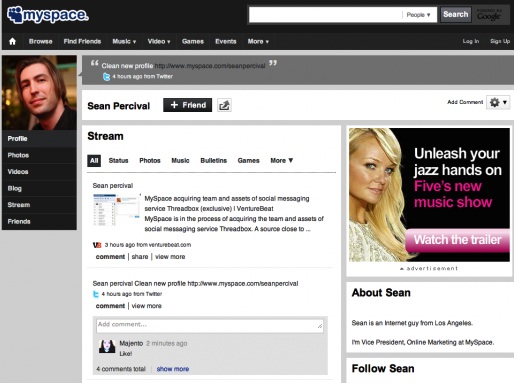Google is all about content; Facebook is all about communication.
- Kailash Ambwani CEO of FaceTime Communications
Today I want to share a few articles that I found over last month or so. All these articles talk about non-intuitive observation. They all point to importance of communication, and how enabling communication is really the key to harness the explosive network effect of social network. Contrary to popular belief, they all talk about content, as we know them, is not the king.
Facebook: When Things Are Shared, They Become More Engaging
60 Minutes Interview With Mark. Worth Watching. Social Message Starting From 10:20 Into It.
LESLEY STAHL: Are you trying to turn everything we do on the web into social function?
MARK ZUKERBERG: I think what we found is that when you can use products with friends and family, people that you care about, they tend to be more engaging.
I think we are going to see this huge shift that a lot of industries and products just going to get remade to be social.
When you think about it, it's rather obvious. Most of things that we do are in context of friends, family and coworkers. We chitchat about how bad the traffic was on the way to work with coworkers, talk about joys of raising a child (and occasional headaches) with your friends and share great cooking tip that you found on the internet with your family.
It's important to find something to talk about (content), but sharing any story (communication), even as banal as talking about how the weather was, is equally or more important as the content itself because it reveals who you are as a person when you communicate.
MySpace: Contents Without Communication Platform
 |
| Yes, New MySpace UI Is A Step In The Right Direction; But Will It Be Enough To Recapture The Lost Users? |
In the article, he talks about conventional wisdom of why MySpace suffered decline:
The decline of MySpace again shows the fragility of social media, where fickle consumers and changing tastes can make sensations out of services like Tribe and Friendster, which quickly fade from public imagination.
The decline of MySpace is a tale with echoes of the ill-fated pact AOL made with Time Warner: A high-flying Internet venture gets caught in a culture clash precipitated by joining a big media conglomerate.
MySpace, though clearly the dominant player, got complacent and never innovated.
Although these are partly true, none of them captures the essence of cause for MySpace failure. He makes the case that MySpace's demise is really caused by neglecting to provide communication platform for close-knit groups. Instead of focusing on communication platform for users to share content with friend, MySpace "diverted its attention to serving eyeballs to advertisers and fell ever more behind on facilitating the 'social' part of social networking".
Anyone who used MySpace would agree. MySpace lost its 'social' edge when it got acquired by News Corp, and spent its energy milking existing users with targeted ads.
Even after revamping its UI, MySpace is not likely to regain the old glory back because they are not focused on letting you connect with friends that you have already. Again, it is about communication, not content.
Studies On Why Communication Matters More Than Content
There were multiple studies done on why communication matters more than content to users.
David P. Reed wrote about how communication harnesses the power of network effect to provide greater value for all connected nodes in 1999.
Andrew Odlyzko also wrote about how content matters less than communication when creating a bigger market.
What do you think about communication having bigger impact to users than content? Do you have your example or counter-example to add? Please leave comment to add your view.
I think the entertainment value of Facebook and platforms that enable communication is the real driver of stickiness. People stay and interact on sites that keep them engaged. The fact that you can chat with friends, comment on status updates, blog posts or event invitations is really about entertainment. People love to be heard, seen and acknowledged and the connections that social networks create nurture those needs. While search has utilitarian value, connecting and communicating even online is a human need. Dare I say we need relationships perhaps even more than we need knowledge?
ReplyDeleteThere are several social networking sites today, among the most popular are Facebook, MySpace and Twitter. Most members of these sites teens who love the company of friends and other people. But did you know how important social networking sites?
ReplyDeleteThank you this very nice post in the scholarship essay writing helpIt's important to find something to talk about (content), but sharing any story (communication), even as banal as talking about how the weather was, is equally or more important as the content itself because it reveals who you are as a person when you communicate.
ReplyDelete